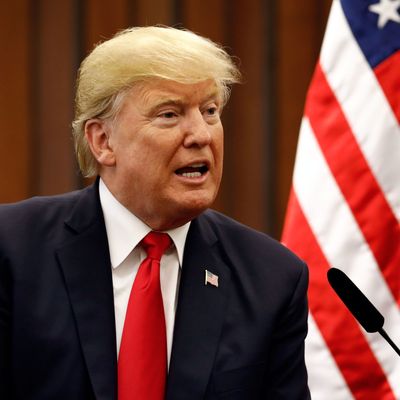
For months, the White House has pledged that its tax plan will not benefit the rich — or, at least, that it won’t do so intentionally.
“Tax reform will protect low-income and middle-income households, not the wealthy and well-connected,” President Trump assured supporters in a recent speech in Indiana. “They can call me all they want. It’s not going to help. I’m doing the right thing, and it’s not good for me. Believe me.”
In late September, National Economic Council director Gary Cohn went further, promising, “The wealthy are not getting a tax cut under our plan.” Other administration officials have conceded that the rich might derive some benefit — but only through the collateral consequences of lowering taxes on the middle class and corporations.
Then, the House and Senate unveiled tax bills that deliver the lion’s share of their benefits to the idle superrich, while raising taxes on a broad swath of middle-class households. The bills would also eliminate deductions that benefit veterans, indebted students, and people who suffer from rare diseases — while preserving loopholes that enrich hedge-fund managers and owners of golf courses.
Meanwhile, both iterations would add trillions to the deficit, in defiance of the president’s campaign promises and, more critically, the rules of budget reconciliation.
Considering all this, it isn’t too surprising that the president decided to do a little back-seat driving Monday, and air an implicit criticism of congressional Republicans’ work. But the nature of that critique was a trifle baffling.
The House tax-cut bill retains the current 39.6 percent rate on couples that earn over $1 million a year (while lowering the rate on couples that make below that figure, but above $480,000, to 35 percent). The Senate bill cuts the millionaires’ rate down to 38.5 percent.
So: The populist president looked at legislation that increases the tax burden of half of all families with children — even as it allows the heirs of multimillion-dollar estates to avoid paying all capital gains taxes on their inherited assets — and concluded: This bill really needs to do more to increase the post-tax income of millionaires, and reduce the number of Americans with health insurance.
Trump’s advocacy for a lower top marginal rate doesn’t just contradict literally all of his messaging on tax “reform” to this point. His proposal also evinces total ignorance of the budgetary challenges Republicans currently face.
Right now, even if Mitch McConnell had 51 votes for the Senate’s tax bill, he wouldn’t be able to pass it. In order to evade a Democratic filibuster, Republicans must pass their tax plan through “budget reconciliation” — but that process can only be invoked for bills that do not add to the deficit ten years after they’re passed. Currently, the Senate bill would add hundreds of billions of dollars to the deficit in 2028. And the Senate bill assumes that the final legislation will generate more than $1 trillion in new revenue by fully eliminating the state and local tax deduction — a benefit that House Republicans insist on retaining in some form. So, the actual budget shortfall is almost certainly even larger.
Killing the individual mandate would generate some revenue. The Congressional Budget Office estimates that such a move would increase the ranks of the uninsured — and, thus, save the government $338 billion on health-insurance subsidies and other costs. But even if Senate Republicans had the votes to sabotage the individual insurance market, they would need the consequent revenue to pay for the cuts they’ve already proposed.
The absolute last thing that the GOP should do now is dig themselves into a deeper fiscal hole, for the sake of giving millionaires a bigger payday.
One of Donald Trump’s core strengths in 2016 was his indifference to conservative ideology. The mogul’s nihilistic pragmatism allowed him to crowdsource his agenda (by adjusting his policies and messaging to suit the whims of his rally crowd), a process that resulted in a heterodox economic platform that included support for entitlement programs, infrastructure stimulus, price controls on pharmaceuticals, universal health care, and breaking up the big banks.
Given the manifest unpopularity of the congressional GOP’s agenda, one might wonder why Trump hasn’t pivoted back to populism. After all, the president is far less interested in the conservative movement’s ideological project than in winning the plaudits of the (fake news) media. (Trump (reportedly) relished the good reviews that followed his debt ceiling deal with “Chuck and Nancy.”) The president has a firmer grip on the Republican base than Paul Ryan or Mitch McConnell. Trump would seem to have much to gain, and little to lose, by trying to dictate terms to Congress, and demanding a bipartisan infrastructure bill; or a progressive, revenue-neutral tax reform package; or a pragmatic fix to the health-care system.
And yet, here he is, bucking the congressional leadership … by calling for an even more regressive tax-cut plan.
This can’t be explained by Trump’s formidable greed. The existing tax plan is already a windfall for the president, and it’s unlikely he has much to gain personally from lowering the top marginal rate on individuals, since most of his income comes via the profits of his pass-through businesses (which would be a taxed at 25 percent if the GOP gets its way).
Rather, Trump’s tweet — and broader failure to impose a more popular platform on his party — appears to be the product of sheer mindlessness. The president was too lazy and incurious to shape his own policy agenda. So, he outsourced it to Vice-President Pence and his team of Koch cronies. Now, Trump can’t even summon the resources to maintain a consistent sales pitch for his tax plan; or develop a rudimentary understanding of the legislative challenges it faces; or, ostensibly, avoid tweeting out whatever moronic proposal one of his plutocratic pals just whispered in his ear.






























